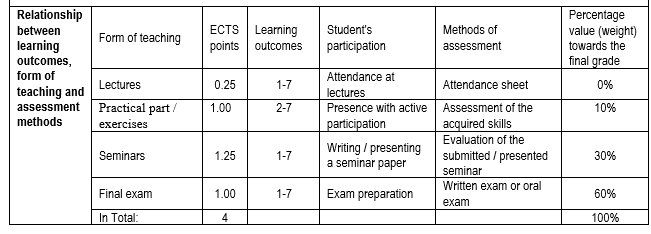The objective of the course is to present students with globalisation processes that affect health, health care, organisation and financing of health care; to familiarize students with the positive and negative aspects of globalisation, the integral model of public-private partnerships in solving global health problems; to emphasize the type and influence of institutions and organisations involved in health policy preparation, to inform students about the EU directives for health care, about the role of the WHO, the World Bank and the OECD in the creation of health care strategies.
The impact of globalization on health. Trade, public health and food. Migration and health. Climate change and disaster: from humanitarian aid to prevention. Globalization and response to epidemiological problems. Priorities in solving global health problems. Institutions and organisations in the preparation of health policies. Populations, health and food. Environment and health. EU healthcare directives. The role of the WHO, the World Bank and the OECD in shaping health strategies. Evaluation of the quality of strategic documents. International cooperation. Communication technologies and globalization.
Obavezna literatura:
- United Nations Millennium Declaration. Resolution A/RES/55/2. Geneva: United Nations, 2000. Dostupno na: https://www.un.org/en/development/desa/population/migration/generalassembly/docs/globalcompact/A_RES_55_2.pdf
- World Health Organization. The world health report 2003: Shaping the future. Geneva: World Health Organization; 2003. Dostupno na: http://www.who.int/whr/2003/en
- Europe 2020.: http://ec.europa.eu/health/europe_2020_en.htm
- https://ec.europa.eu/health/policies/overview_hr
Dopunska literatura:
- McKee M, Garner P, Stott R. International co-operation in health. Oxford, UK: Oxford University Press; 2001.
Upon completion of this course, students will be able to:
- Explain the role and functioning of the world's leading public health organizations, national public health programs and national strategies and plans;
- Interpret the positive and negative sides of globalization processes and use the positive effects of globalization in public health, and think critically about the quality of strategic documents for health;
- Assess the role of public health in emergencies, the specifics of communication in public health and the application of ethical principles in public health;
- Identify the impact of environmental factors on health and the global context of public health and global public health priorities;
- Argue the concept of international health and indicators of the health status of the population;
- Recognize the specifics of particularly vulnerable population subgroups, health care and public health priorities and their basic features, as well as some new challenges in public health and their particularities;
- Describe individual steps in the analysis of the health safety of drinking water and participate in the sampling of drinking water samples;



